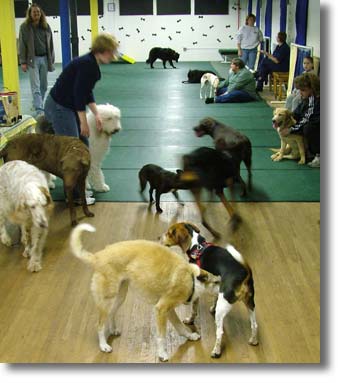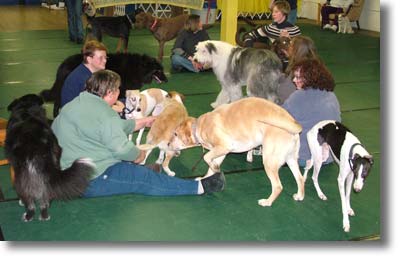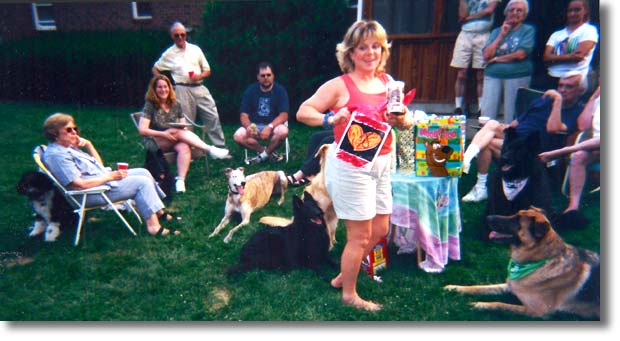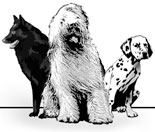Social Dogs
| the secret to success... Socialization is the process by which a dog must be exposed to everything he needs in order to experience a well-adjusted life. The crux of this socialization period is constantly disputed by the experts, but the average estimate is that it occurs between the ages of 7 and 14 weeks. This means that your little puppy has the best chance of growing up to be a "normal dog" if he has many repeated positive exposures to all sorts of people, places, things, and animals. The opportunities for this exposure are endless. By offering treats to your puppy whenever he meets up with children, older people, people of different colors, physical disabilities, people with moustaches, hats, beards, glasses, other dogs, loud noises, cars, buses, trucks, horses, cats...(you get the idea!), you increase your chance that he will have a positive association with them. |
||||||||||||||
 |
||||||||||||||
| It is preferable that the puppy experience each of these things several times. The reason for this is that dogs do not generalize very well. It takes them many more exposures to something for them to group them together than it does for humans. It is our job to help the puppy to do that. Furthermore, a loud noise or other distraction may create a negative association for the puppy to that thing. Several positive exposures will help to dissipate the negative association. |
||||||||||||||
 |
||||||||||||||
| The socialization period is not over at 14 weeks, however. Puppies simply become more suspicious of new things as they get older. It is still relatively easy to introduce them to new things when they are 4 months, but at 5 months they are starting to be more leery. By 6-8 months you may have difficulty in new situations with your dog, and by one year you may need to do remedial work with your dog in new situations. It becomes painfully obvious at that point that the best time to do this work is BEFORE problems occur. |
||||||||||||||
| Puppy class is one of the ways in which we can achieve the goal of socializing our puppies. Most classes enable puppies to socialize with each other and with people. This is an important first step. But not all sizes, shapes, colors and personalities of dogs and people will be represented in these classes. So the techniques of socializing your puppy in class must be applied to other places in your daily life, as well. Don't forget that socializing also pertains to routine canine care. Habits such as cratetraining, brushing, nail trimming, bathing, ear cleaning, tooth brushing, and being touched, restrained or manipulated need to be accepted by puppies. Waiting until the puppy is 6 months old to teach him to accept a bath is often a mistake which places an unfortunate burden on the canine-human relationship. |
||||||||||||||
 |
||||||||||||||
|
And one last thing: introducing your puppy to all of these stimuli at the age of 3 months is a great start, but the exposure must continue! Many people take their puppies to puppy class and believe that their puppy has been socialized. Then the puppy goes home and doesn't see another dog until he is two years old. That dog has now missed the opportunity to interact appropriately with other dogs for 19 months. All of those skills are rusty or forgotten. It's just like going to the gym: you can't go for a month and think you'll be in good shape for the rest of your life! Owning a dog is a big commitment to undertake, and socializing that dog is an ongoing process and part of the human's responsibility. Great Companions is there to assist you in that endeavor! |
||||||||||||||



